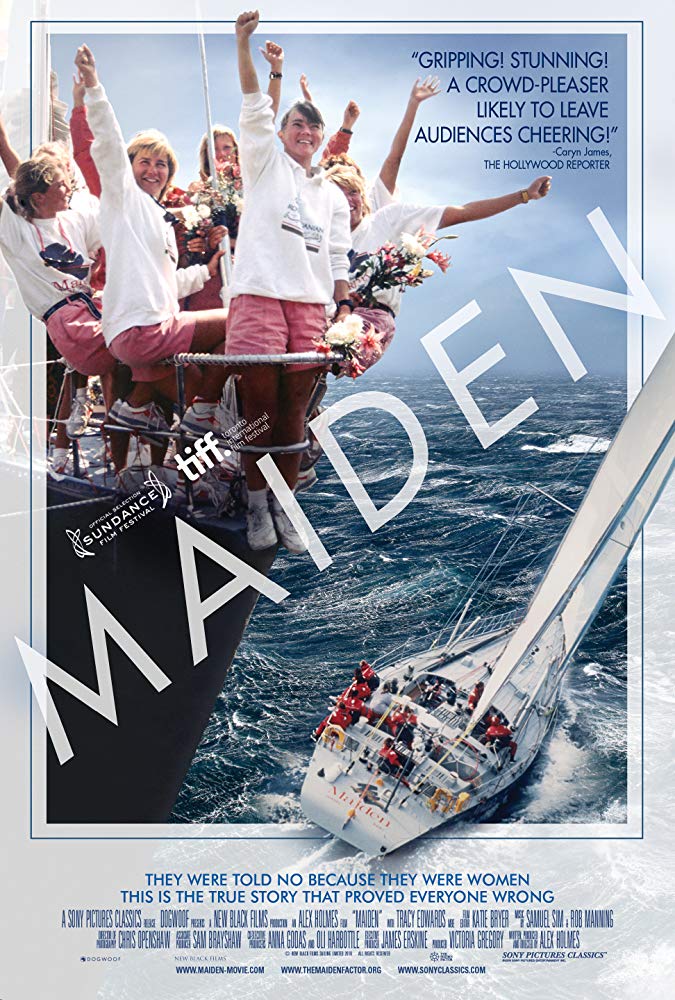Maiden
Maiden tells the triumphant story of a group of women who did something that had never been done before, something no one thought they could ever do. In 1989, skipper Tracy Edwards entered the first all-female crew into the Whitbred Round the World Race. This is a quest to sail around the globe, involving weeks at a time out at sea. A male-dominated sport, it was commonly believed by practitioners to be too much for women to handle, due to the strength needed to maneuver the boats through occasionally treacherous conditions. Edwards and her crew proved those men wrong.
Early scenes in the film have Edwards, who appears on-camera, describing how she came to be interested in sailing and how it gave her back some of the focus she'd lost during adolescence. Her father's death and her mother's subsequent remarriage to an abusive man created a rebellious streak inside of her. Eventually, she decided that she wanted to enter Whitbred, if for no other reason than it gave her plenty to rebel against.
Her crew members also appear in the documentary. Their reflections are fascinating. On one hand, Edwards' take-no-prisoners mentality was just what they needed to successfully compete. On the other hand, she garnered a fair amount of resentment in the process. Still, her determination and willingness to call in a favor from old friend King Hussein of Jordan helped them get a sponsor and a capable boat. Once ready to sail, they still had to face misogyny from fellow competitors and the media.
The highlights of Maiden are the sailing sequences, of which there are many. To the audience's great benefit, large portions of the journey were filmed. If you've ever wanted to know what it would be like to sail around the world, just see this movie. We watch as the women cling for dear life when massive waves rock the boat or deal with boredom when the wind doesn't blow for hours, leaving them slowly drifting. At one point, Edwards makes a calculated decision to catch up with – and potentially overtake – the men beating them. She opts to take a generally ill-advised direct route skirting Antarctica that puts her crew in sub-zero wind chills, with ice visibly forming on various parts of the vessel.
Seeing how all this was accomplished is nothing short of riveting. More than that, though, Maiden is a celebration of teamwork. Edwards might have been the most outwardly driven, but every woman on that boat shared the exact same level of passion. Tensions could certainly arise; when they did, the women used that strife as a motivational tool. This very quality is what allowed them to upend all the traditional assumptions that women weren't cut out for Whitbred.
Although what happened in the race is easily looked up on Google, revealing it here seems unwise. If you know, fine. If not, don't research. Maiden builds suspense as the race moves to its last leg. The final moments – like the finale of the event itself – serve as a reminder that a physical victory might get you a nice trophy, but a symbolic victory yields something you'll cherish for life.
Director Alex Holmes deftly blends interviews with sailing footage. He wisely allows his subjects to speak for themselves. Tracy Edwards is a remarkable person, as are all her crew members. Their memories are filled with emotion, making us care intensely about their tale, whether or not we care about sailing overall.
Maiden is an inspirational tribute to a group of kick-ass women who defied the odds because they knew they were as tough and qualified as any male crew. You'll be cheating yourself if you miss this enthralling film.
out of four
Maiden is rated PG for language, thematic elements, some suggestive content and brief smoking images. The running time is 1 hour and 37 minutes.
